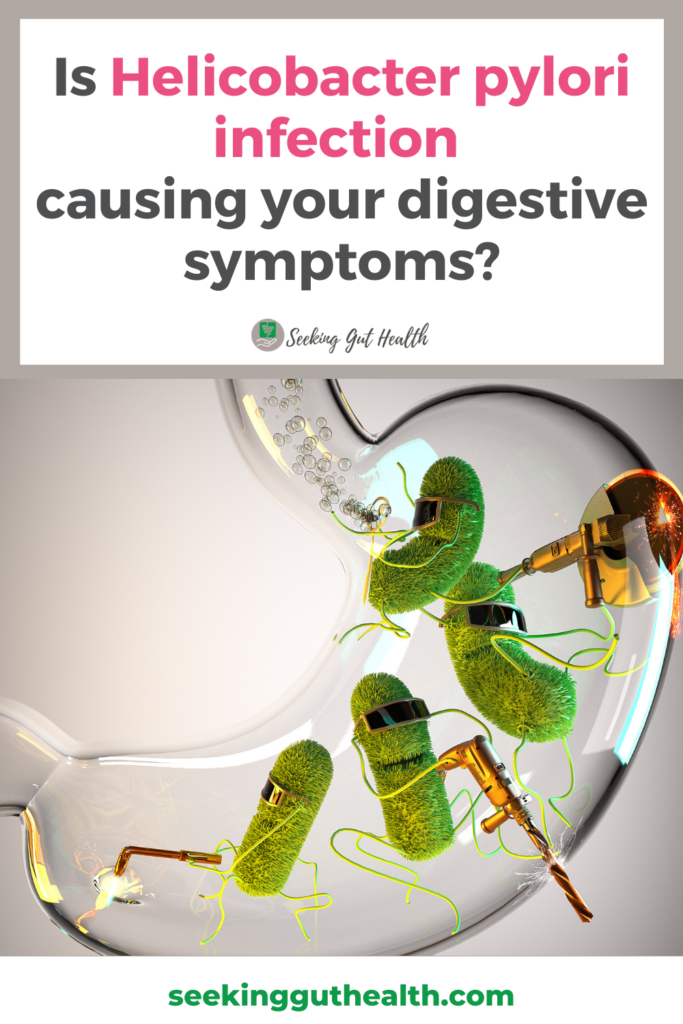
Can Helicobacter pylori infection be the root cause of SIBO?
My short answer is yes.
When you are diagnosed with SIBO (Small Intestinal Bacterial Overgrowth), this is just one step closer to healing. It might not be enough to treat only SIBO but dig deeper to discover any underlying causes of SIBO. One of the root causes can be Helicobacter Pylori infection.
What is Helicobacter Pylori (or shortly H. Pylori)?
Helicobacter Pylori is a gram-negative bacterium that resided in the stomach that may attack the stomach lining. H. pylori infection doesn't necessarily cause symptoms, but when it does, especially during acute infection, it can cause gastritis (inflammation of the stomach lining), or gastric/duodenal ulcers, and other symptoms such as pain (especially when the stomach is empty), bloating, frequent burping, nausea, and appetite loss. (1)
Some studies suggested that H. pylori infection is responsible for causing a wide range of other diseases; for example, it is also associated with stomach cancer. (2) However, according to Dr. Martin Blaser, a researcher in microbiology and infectious diseases, H. pylori's non-pathogenic strains also have protective effects against some diseases like asthma (3)
How can Helicobacter Pylori infection lead to SIBO?
H. pylori can lead to SIBO by lowering stomach acid levels. It produces urease, an enzyme to neutralize stomach acid. (4) Some say that it can develop because of the low stomach acid level. It can be a chicken and egg scenario. While many people believe it is a good thing because too much acid causes their reflux symptoms (heartburn, burping, indigestion), but in reality, on the contrary. We need an adequate stomach acid level to kill pathogens (so we don't end up with food poisoning) and prevent overgrowth of bacteria in the small intestines and ensure a good digestive process. Stomach acid is also needed for enzyme activation and mineral absorption. (5)
How is Helicobacter Pylori infection diagnosed?
There are some noninvasive tests:
- stool tests that can determine if you have H. pylori, some of the advanced tests can also check for virulence factors,
- a urea breath test,
- a blood test to look for antibodies.
An invasive test can be when your GI doctor performs an endoscopy with biopsy, so they take several samples and send them to the lab. (6)
What happens when you are tested positive for H. pylori?
The most common conventional treatment is "Triple therapy," including antibiotics and Proton Pump Inhibitors (PPIs). This method's problem is that H. pylori has high resistance rates to some commonly used antibiotics (7). Using antibiotics can also lead to dysbiosis (by killing the good gut bugs) and potentially to SIBO. However, H. pylori need to be addressed when a person has a gastric ulcer or a higher risk for gastric cancer.
Restoring your gut microbiome is essential after treatment through diet and lifestyle changes and the right supplements. Probiotics could also be a great help with balancing gut bacteria. A study showed that probiotics used before or after the triple therapy significantly increased the eradication rate of H. pylori. (8)
Natural approaches for Helicobacter pylori infection
Natural methods can also support the elimination of H. Pylori. Before starting a natural treatment program, be sure to consult with your doctor.
Green tea
Research conducted on mice indicated that green tea might have antibacterial properties that help prevent and delay the development of Helicobacter bacteria. Consumption of green tea could prevent Helicobacter-induced gastritis. (9)
Licorice root extract
A study found that Licorice root cannot eliminate H.pylori by itself but may help prevent H. pylori from adhering to the stomach cell membranes. (10)
Probiotics
A study was done to analyze the effectiveness of probiotics used in H. Pylori treatments. "Lactobacillus casei was identified the best for H. pylori eradication rates," and multi-strains of Lactobacillus and Bifidobacteria probiotics were successfully used for reducing side effects of treatment such as diarrhea; constipation; taste disturbance, nausea/vomiting. (11)
Saccharomyces Boulardii
It is a beneficial yeast that has many positive effects on the body. It has been shown to be effective in the antibiotic therapy of H. pylori and reduce side effects such as bloating. (11)
Summary
Not everyone who is infected with Helicobacter pylori will ever experience symptoms. But in case you have digestive symptoms and a family history of stomach cancer, it is favorable to reach out to your medical provider and get tested and treated. The traditional way to eliminate H. pylori is through antibiotics. Although a huge concern is that H. pylori has antibiotic resistance, and the therapy has side effects. However, the usage of probiotics and other natural remedies may also help fight against H. pylori. Before trying more traditional treatment, see whether you can successfully cure your H. pylori infection with natural approaches.
*This post is only for informational purposes and is not meant to diagnose, treat or cure any disease. I recommend consulting with your healthcare practitioner always before trying any treatment or dietary changes.
Wu, M. L., & Lewin, K. J. (2001). Understanding Helicobacter pylori. Human pathology, 32(3), 247–249. https://doi.org/10.1053/hupa.2001.22898
Camilo, V., Sugiyama, T., & Touati, E. (2017). Pathogenesis of Helicobacter pylori infection. Helicobacter, 22 Suppl 1, 10.1111/hel.12405. https://doi.org/10.1111/hel.12405
Blaser, M. J. (2010). Helicobacter pylori and Esophageal Disease: Wake-up Call? Gastrojournal, 1819-1822. doi:https://doi.org/10.1053/j.gastro.2010.10.037
Enko, D., & Kriegshäuser, G. (2017). Functional 13C-urea and glucose hydrogen/methane breath tests reveal significant association of small intestinal bacterial overgrowth in individuals with active Helicobacter pylori infection. Clinical biochemistry, 50(1-2), 46–49. https://doi.org/10.1016/j.clinbiochem.2016.08.017
Ramsay, P. T., & Carr, A. (2011). Gastric acid and digestive physiology. The Surgical clinics of North America, 91(5), 977–982. https://doi.org/10.1016/j.suc.2011.06.010
Huh, C. W., & Kim, B. W. (2018). The Korean journal of gastroenterology = Taehan Sohwagi Hakhoe chi, 72(5), 229–236. https://doi.org/10.4166/kjg.2018.72.5.229
Yang, J. C., Lu, C. W., & Lin, C. J. (2014). Treatment of Helicobacter pylori infection: current status and future concepts. World journal of gastroenterology, 20(18), 5283–5293. https://doi.org/10.3748/wjg.v20.i18.5283
Du, Y. Q., Su, T., Fan, J. G., Lu, Y. X., Zheng, P., Li, X. H., Guo, C. Y., Xu, P., Gong, Y. F., & Li, Z. S. (2012). Adjuvant probiotics improve the eradication effect of triple therapy for Helicobacter pylori infection. World journal of gastroenterology, 18(43), 6302–6307. https://doi.org/10.3748/wjg.v18.i43.6302
Stoicov, C., Saffari, R., & Houghton, J. (2009). Green tea inhibits Helicobacter growth in vivo and in vitro. International journal of antimicrobial agents, 33(5), 473–478. https://doi.org/10.1016/j.ijantimicag.2008.10.032
Nicole Wittschier, G. F. (2009). Aqueous extracts and polysaccharides from Liquorice roots (Glycyrrhiza glabra L.) inhibit adhesion of Helicobacter pylori to human gastric mucosa,. Journal of Ethnopharmacology, 125(2), 218-223. doi:https://doi.org/10.1016/j.jep.2009.07.009.
Feng, J. R., Wang, F., Qiu, X., McFarland, L. V., Chen, P. F., Zhou, R., Liu, J., Zhao, Q., & Li, J. (2017). Efficacy and safety of probiotic-supplemented triple therapy for eradication of Helicobacter pylori in children: a systematic review and network meta-analysis. European journal of clinical pharmacology, 73(10), 1199–1208. https://doi.org/10.1007/s00228-017-2291-6

Alexandra is a Functional Medicine Certified Health Coach & Holistic Nutritionist specializing in IBS, SIBO, and Gut Health. She helps her clients identify the root causes of their chronic gut issues with functional testing, supporting their bodies holistically and implementing the necessary lifestyle changes long-term to regain control of their bodies and enjoy food freedom. Book your FREE SIBO Assessment call now >>>
